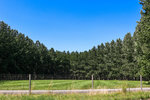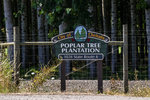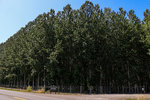


A mix of funds from state, local and private sources is set to launch a study to explore the feasibility of constructing a biorefinery in Lewis County — a development backers say would be a major economic boost to the region.
Monday, county commissioners will vote to put $120,000 from its Distressed Counties fund toward the study — adding to money already allotted from the state and a TransAlta Coal Transition grant. The study, which will cost about $600,000 in total, will be conducted by the University of Washington.
“It’s seeing if we’ve got the landowners that are willing to participate in growing those poplar trees,” said Bob Guenther, who has been one of the local backers of the project. “We’re working with the small forest landowners as well as some of the major timber companies. … We’ve got to know what the heck we’re doing before we can commit to getting a company in here to build a large refinery.”
Research conducted in 2011 by the University of Washington identified Lewis County as a prime location for a biorefinery, a facility that converts poplar trees into fuels and chemicals. Richard Gustafson, a chemical engineer with the university, noted that cheap land and available water in the area could make it an ideal spot to put poplar plantations that don’t require irrigation.
Leaf Resources, an Australian company, has expressed interest in the area, Gustafson said. The study could help show if area farmers and landowners are willing to buy into that vision, planting poplars to provide the supply that would allow the company — or another in the industry — to build a biorefinery in Lewis County.
“It’s — will this work?” Gustafson said. “I’m pretty sure it will. It’s to lay the groundwork for someone who wants to do something in Lewis County. It will provide them a lot of information. It will already be laid out so they can make a decision. ... It’s a way to attract investment.”
The feasibility study is expected to take about three years. County commissioner Edna Fund said the proposal demonstrates the county’s growth in the energy industry, noting recent wind and solar developments underway.
“We’re getting a name for all the energy options we have here and this is another one,” she said. “It feels really good to be on the cutting edge of this. … It’s nice to be the leaders for something other than unemployment.”
When commissioners vote Monday to provide their portion of funding for the project, they’ll be using Distressed Counties funding, money collected from a state sales tax for economic development in rural counties. Fund said the proposal is an ideal use of those funds.
“It could be a real economic driver,” she said. “We’re truly doing the mission of what those funds are meant for.”
According to Gustafson, a completed moderate-sized biorefinery and the tree farms that supply it would provide about 200 direct jobs, with another 750 indirect jobs tied to the development. Such a facility would produce about $190 million in economic output over its lifespan, with another $100 million invested in the construction period.
“The idea of a biorefinery is that we take biomass in and produce fuels and chemicals and products to make it viable environmentally but also an economically solid enterprise,” he said. “The area is economically not as strong as other parts of the state, so having an industry that is anchored there could be a big boost.”
Guenther added that a biorefinery in Lewis County would create a market for 250,000 tons of poplar pulp each year, which local farmers could supply knowing it is a product that has proven profitable. He estimated that the facility would produce 8 million gallons of clean diesel annually.
“That’s a lot of work and a lot of workers and a lot of opportunity for companies to do that harvesting, planting and growing,” he said.